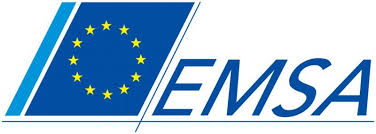
(www.MaritimeCyprus.com) The EMSA Outlook 2024 outlines the Agency’s strategic priorities for the upcoming year. Aligned with the overarching multi-annual strategic goals, these key focus areas are derived from the officially endorsed Single Programming Document (2024-2026), a robust roadmap adopted by EMSA’s Administrative Board in November 2023.
Structured around seven thematic categories, this publication places a strong emphasis on Sustainability, Safety & Security, Surveillance, and Simplification, reinforcing the Agency’s commitment to addressing the associated fundamental maritime challenges.
Complementing these core areas, is the Agency’s focus on three cross-cutting themes – Digitalisation, Technical Assistance and Strategic Support.
This strategic framework steers EMSA’s operational initiatives and serves as the structure for this publication. Each chapter provides a comprehensive overview of the Agency’s efforts within these domains. Below, we offer a preview of some noteworthy highlights for the year ahead.
This structure is reflected in the chapters of the publication, for which we share some
highlights below:
Sustainability:
With increasing urgency for action in the field of sustainability, EMSA will be providing
support in the implementation of the measures linked to the European Green Deal, such
as the ‘Fit for 55’ package which refers to the EU’s target of reducing net GHG emissions
by at least 55% by 2030. This package includes among others the FuelEU Maritime proposal, the extension of the EU Emissions Trading System to maritime transport and
the revision of the Alternative Fuels Infrastructure Regulation. EMSA will continue to work
alongside the European Commission to support any further initiatives of relevance for
greener shipping, including the EU Taxonomy for sustainable maritime financing.
Surveillance:
In the surveillance domain, national authorities performing coast guard functions in the Member States and EU Agencies will continue to benefit from the innovative maritime surveillance services EMSA has developed and will continue to develop. These complement surveillance capabilities achieved by more traditional means (terrestrial AIS, manned aircraft and patrol vessels).
Safety and Security:
Safety and security-related considerations remain high on the Agency’s agenda, particularly as the maritime sector faces increasing challenges and opportunities in these areas with the various transitions underway, including efforts towards zero-carbon fuels and the propulsion systems required to use them, and the drive towards digitisation and automation. EMSA will further study the safety risks posed by alternative fuels and will start to work on guidance for the safe use of these fuels together with stakeholders (addressing them one-by-one). The Agency will also finalise the work on the safe use of battery systems in maritime applications. The Agency will also assign new studies with a focus on key safety issues and pursue the follow-up to previous and ongoing studies.
Safety and Security:
EMSA is dedicated to improving commercial shipping safety and marine equipment quality
standards in collaboration with the European Commission. By leveraging technical expertise
from Member States and industry, EMSA ensures a diverse perspective on safety issues,
enriching outcomes. The Agency fosters stakeholder collaboration, commissions studies to support decision-making, and addresses uncertainties related to new technologies.
In 2024, emphasis will be on the safety aspects of innovative developments, such as cleaner propulsion methods and autonomous ships (MASS). EMSA will be introducing a
pilot risk-based assessment tool for MASS and coordinating efforts on safety challenges
of using ammonia for propulsion and the bunkering of biofuels, among others. EMSA will continue to address safety concerns identified in the first European Maritime Safety Report (EMSAFE) published in 2022.
Simplification:
EMSA supports greater simplification through a variety of digital services designed to enhance maritime operations. Efforts in 2024 will focus on leveraging technology to enhance information exchange, streamline reporting and further promote the digitalisation of maritime operations. The quality of ship and ship-related information is crucial for maritime digital services. EMSA will continue supporting Member States in implementing and testing the SafeSeaNet system, with a focus on version 5 in 2024. A long-term archive of SafeSeaNet data will be created for extended analysis using cloud-based solutions and
advanced data analysis techniques.
SafeSeaNet will also undergo further upgrades to offer facilitation services to coastal stations for ship-to-shore reporting. The goal is to simplify reporting obligations, reuse information, and consolidate SafeSeaNet as a central platform for maritime information exchange.
Digitalisation:
Integrated Maritime Services (IMS) will continue to be enhanced with additional customised features, functionalities, data sets and individual services in line with the evolving requirements of the growing user communities. Collaboration through webinars, hybrid training and the EMSA Academy will drive further developments in 2024.
Technological upgrades to IMS will enhance performance, particularly benefiting users with low internet bandwidth. New services, responding to specific Vessel Traffic Monitoring & Information System (VTMIS) needs will be delivered through IMS toolboxes to various Member State authorities.
Technical Assistance:
EMSA’s visits and inspections continue to be a key tool to improving maritime safety, security and sustainability, through the identification of strengths and weaknesses in the implementation of EU law. Combined with the horizontal analyses carried out on the findings established during the visits, the Member States and the European Commission gain a clear picture of where additional effort would be beneficial or changes to EU law may be desirable.
Strategic Support:
In the upcoming year, EMSA will leverage its diverse range of services to ensure financial efficiency and operational effectiveness, benefiting other EU stakeholders through collaborative experiences and shared contributions.
EMSA remains committed to providing various services through bilateral cooperation agreements to EU bodies and stakeholders with maritime-related functions, supporting their overarching objectives. Recipients of these services include key organisations such as the European Fisheries Control Agency (EFCA), European Naval Forces (EUNAVFOR Atalanta and EUNAVFOR Med), European Union Agency for Law Enforcement Cooperation (Europol), the European Border and Coast Guard Agency (Frontex), the Maritime Analysis and Operations Centre – Narcotics (MAOC (N)), and the Emergency Response Coordination Centre (ERCC). The ongoing support to the ERCC will persist within the framework of the anticipated new Working Arrangement between EMSA and the European Commission’s DG ECHO.
For more interesting details, you can download the full report "EMSA Outlook 2024" by clicking below:
Source: EMSA















